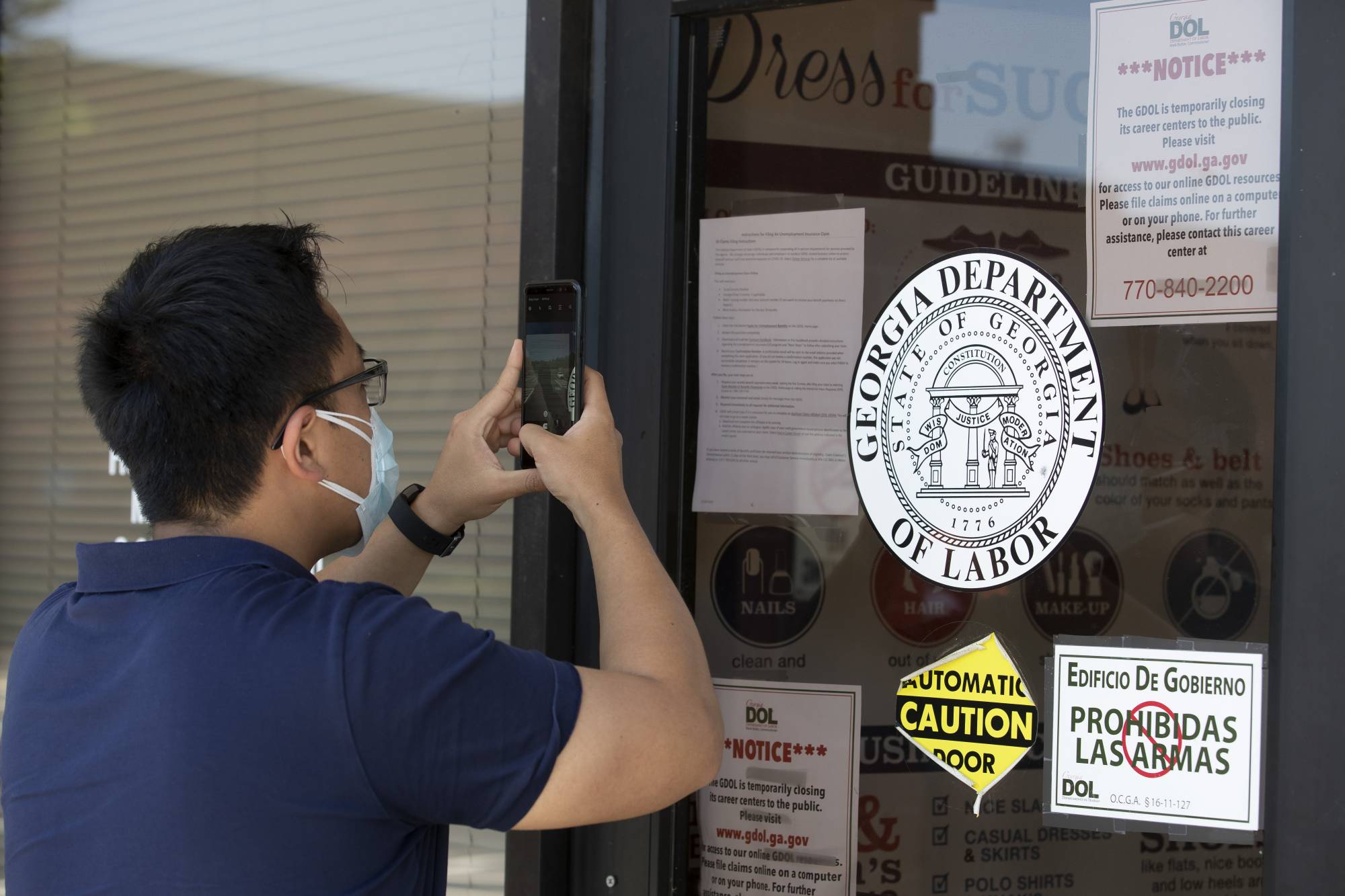
An update from the Secretary on the Labor Department’s apprenticeship plan
The Labor Department has appointed 29 members to its Advisory Committee on Apprenticeship.
Best listening experience is on Chrome, Firefox or Safari. Subscribe to Federal Drive’s daily audio interviews on Apple Podcasts or PodcastOne.
You’ve heard of the labor shortages facing many sectors of the economy. One path to bring in more nurses, technicians or mechanics might be to reinvigorate apprenticeship programs. Now the Labor Department has appointed 29 members to its Advisory Committee on Apprenticeship, a move officials hope will guide them towards improving that whole situation. For more on the administration’s plans, Eric White for Federal Drive with Tom Temin spoke with Labor Secretary Marty Walsh.
Interview transcript:
Marty Walsh: Really the apprenticeship programs are is about creating a pathway for people into good careers and good jobs in our country. And they’ve been here at the Department of Labor for quite some time now. What we did was we kind of relaunched the advisory committee to really make sure that as we make these investments, that they’re really targeted investments and getting people trained into new jobs.
Eric White: And is that the main mission of the advisory committee or does it have other objectives?
Marty Walsh: Or they’re gonna have other objectives, they’re going to focus around really critical issues around the national apprenticeship system. They’re going to be looking at expansion and modernization. Obviously, diversification, President Biden’s Equity Plan is all throughout government, so looking at diversification of the national apprenticeship model to make sure that we’re creating pathways for African-American and Latino, people of color and just making sure that’s there. Also we’re gonna be looking at expansion of apprenticeships into new industry, probably this is the biggest thing. And to new industries, sectors, cybersecurity – looking at that – clean energy, obviously, with the investments in clean energy in the carbon goals the president has laid out. Advanced manufacturing, we hear a lot about modernization of manufacturing, and kind of losing the actual people working in those and really teaching, helping about advanced manufacturing. IT is another big area, Information Technology is something that is a real big opportunity there. And health care, I’ve gone around the country and we all know that there’s, you know, a nursing shortage in this country today and in the next 10 years is potentially gonna be a crisis if we don’t do something about it. So we have an opportunity with health care. And I also think mental health services, there’s an increasing need for mental health counselors and services, and diversified pool of people. We need to make sure that we have people of color doing – I saw it in Boston when I was the mayor, when we brought on more counselors into our schools, it was far more impactful when we have Latino and African American and counselors of color working with young people of color. The district was majority kids of color. We’re also looking at making sure there’s equitable access for all workers to participate and succeed in the national program. So I’m excited about the Advisory Committee. It’s a 29-member committee, there’s a two-year appointment on it. It’s a really diversified group from different sectors in different industries. And you know, it’s not all slanted one way or the other. We’re very intentional about making sure that we have nonprofits represented on there, businesses represented, Labor’s represented, organizations – so it’s really potentially a great opportunity and a great group. Community colleges represented on there. So I think it’s a good group of folks that can do some great work.
Eric White: Other than going into new arenas into new industries, and so forth, are there other ways that the national apprenticeship model has been modernized by you all, maybe even from a programmatic side or grant-making side?
Marty Walsh: Well, I’ve only been here for six months, so I know that our team has been working on it for quite some time. And we’re in the conversation right now about grant-making, and modernizing’s probably the perfect word to use. Modernizing is exactly what we need to do in the system. When I say modernizing, when you say modernizing I don’t think we necessarily mean technology. I think we mean reaching out, getting a bigger applicant pool, and then modernizing how we do our business.
Eric White: And how does the department kind of take note of what sectors of the economy could be good for apprenticeships? I know that you mentioned the nursing shortages. Is it just of hey, we need workers here, let’s start an apprenticeship program? Or do other factors come into play?
Marty Walsh: No, it’s factors. We look at data, we talk to Commerce, talk to Education, the secretaries, but also the teams over there. What are they hearing from the industries? Some of it’s my own expertise, Secretary [Gina] Raimondo – secretary of Commerce’s expertise as a governor. So it’s a little bit of everything. And it’s not really that hard to understand when we’re looking at industry in America and what’s emerging, in what areas we need to have better training and better apprenticeships in. I think that historically, we’ve always thought of apprenticeships as maybe construction or manufacturing, things like that, which it is. But we have an opportunity at this moment in time to, in the 21st century, to really think about how do we enhance that and create more opportunity and more buzz in these different areas.
Eric White: Yes, speaking from a younger generation, there is sort of desire to go back to apprenticeship programs, when you know the college route is getting kind of saturated by things. Is there an effort by the department to promote to the newer generations for the idea of going into an apprenticeship program?
Marty Walsh: Yeah, there is. We’ve spent a lot of time here in talking in the last couple of months about – and I’m not saying we shouldn’t do this, the big push for college where the last 20-25 years in this country we were so focused on getting young people into college that quite honestly some areas we took our eye off the ball a bit. And now we’re seeing potential shortages and construction shortages in manufacturing and then these new emerging industries, the tech industry, oftentimes you don’t need to have a master’s degree to work in those areas. So we have opportunities. So I think by creating these pathways, and that’s why I think this younger generation, we need to get this right. This younger generation is going to see if these programs aren’t good. They’re going to feel it. And I think that we don’t want to miss that opportunity.
Eric White: I wanted to go back real quick on the selection of the members of the Advisory Committee, can you just tell me a little bit about what went into that selection process?
Marty Walsh: We posted it, a lot of people applied. And I think there was an application process, was a selection committee. Pretty much as far as my involvement in it, I was presented with a list of a slate that was recommended.
Eric White: Anything else that we haven’t touched on that you want to make sure is out there?
Marty Walsh: I’ll just end with this: Apprenticeships, certainly, as we talked about can be found in all different industries. But I think it’s really important at the Department of Labor and the team here, we’re looking to make sure we continue the expansion. So not only are we building on the current programs, and there is a need for building trades, there is a need for construction. There’s a need for plumbers, there’s a need for laborers, it need for electricians. But it’s also important for us to acknowledge and recognize the emerging industries – use nursing as an example. We know there’s a shortage in America today. But the shortage is not as drastic as it will be in 10 years if we don’t take action. So I think that we can use apprenticeships to think about what are the jobs of the next decade, what are going to be needed, where the shortfall is going to be? And I think that to keep our economy moving forward, and to keep our country leading in the world, we’re gonna have to identify those areas and make investments in those areas.
Copyright © 2025 Federal News Network. All rights reserved. This website is not intended for users located within the European Economic Area.
Tom Temin is host of the Federal Drive and has been providing insight on federal technology and management issues for more than 30 years.
Follow @tteminWFED





